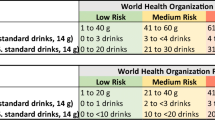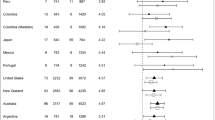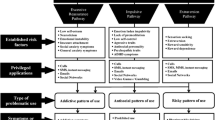Abstract
OBJECTIVE: To identify gender differences in social and behavioral factors associated with antiretroviral adherence.
DESIGN: Prospective cohort study.
SETTING: Methadone maintenance program.
PARTICIPANTS: One hundred thirteen HIV-seropositive current or former opioid users.
MEASUREMENTS AND MAIN RESULTS: Participants were surveyed at baseline about social and behavioral characteristics and at monthly research visits about drug and alcohol use and medication side effects. Electronic monitors (MEMS) were used to measure antiretroviral adherence. Median adherence among women was 27% lower than among men (46% vs. 73%; P<.05). In gender-stratified multivariate models, factors associated with worse adherence in men included not belonging to an HIV support group (P<.0001), crack/cocaine use (P<.005), and medication side effects (P=.01). Among women, alcohol use (P=.005), heroin use (P<.05), and significant medication side effects (P<.005) were independently associated with worse adherence. In a model including both men and women, worse adherence was associated with lack of long-term housing (P<.005), not belonging to any HIV support groups (P<.0005), crack or cocaine use (P<.01), and medication side effects (P<.0005). In addition, worse adherence was associated with the interaction between female gender and alcohol use (P ≤ .05).
CONCLUSIONS: In this cohort of current and former opioid users, gender-stratified analysis demonstrated that different social and behavioral factors are associated with adherence in men and women. Among both men and women, worse adherence was associated with lack of long-term housing, not belonging to an HIV support group, crack/cocaine use, and medication side effects. Among women only, alcohol use was associated with worse adherence.
Similar content being viewed by others
References
Bangsberg DR, Perry S, Charlebois ED, et al. Non-adherence to highly active antiretroviral therapy predicts progression to AIDS. AIDS. 2001;15:1181–3.
Garcia DO, Knobel H, Carmona A, Guelar A, Lopez-Colomes JL, Cayla JA. Impact of adherence and highly active antiretroviral therapy on survival in HIV-infected patients. J Acquir Immune Defic Syndr. 2002;30:105–10.
Hogg RS, Heath K, Bangsberg D, et al. Intermittent use of triplecombination therapy is predictive of mortality at baseline and after 1 year of follow-up. AIDS. 2002;16:1051–8.
Eldred LJ, Wu AW, Chaisson RE, Moore RD. Adherence to antiretroviral and pneumocystis prophylaxis in HIV disease. J Acquir Immune Defic Syndr Hum Retrovirol. 1998;18:117–25.
Moatti JP, Carrieri MP, Spire B, Gastaut JA, Cassuto JP, Moreau J. Adherence to HAART in French HIV-infected injecting drug users: the contribution of buprenorphine drug maintenance treatment. The Manif 2000 study group. AIDS. 2000;14:151–5.
Wagner GJ. Predictors of antiretroviral adherence as measured by self-report, electronic monitoring, and medication diaries. AIDS Patient Care STDS. 2002;16:599–608.
Carrieri MP, Chesney MA, Spire B, et al. Failure to maintain adherence to HAART in a cohort of French HIV-positive injecting drug users. Int J Behav Med. 2003;10:1–14.
Holzemer WL, Corless IB, Nokes KM, et al. Predictors of self-reported adherence in persons living with HIV disease. AIDS Patient Care STDS. 1999;13:185–97.
Bouhnik AD, Chesney M, Carrieri P, et al. Nonadherence among HIV-infected injecting drug users: the impact of social instability. J Acquir Immune Defic Syndr. 2002;31(suppl 3):S149-S153.
Golin CE, Liu H, Hays RD, et al. A prospective study of predictors of adherence to combination antiretroviral medication. J Gen Intern Med. 2002;17:756–65.
Gordillo V, del Amo J, Soriano V, Gonzalez-Lahoz J. Sociodemographic and psychological variables influencing adherence to antiretroviral therapy. AIDS. 1999;13:1763–9.
Chesney MA, Ickovics JR, Chambers DB, et al. Self-reported adherence to antiretroviral medications among participants in HIV clinical trials: the AACTG adherence instruments. Patient Care Committee and Adherence Working Group of the Outcomes Committee of the Adult AIDS Clinical Trials Group (AACTG). AIDS Care. 2000;12:255–66.
Paterson DL, Swindells S, Mohr J, et al. Adherence to protease inhibitor therapy and outcomes in patients with HIV infection. Ann Intern Med. 2000;133:21–30.
Arnsten JH, Demas PA, Grant RW, et al. Impact of active drug use on antiretroviral therapy adherence and viral suppression in HIV-infected drug users. J Gen Intern Med. 2002;17:377–81.
Turner BJ, Laine C, Cosler L, Hauck WW. Relationship of gender, depression, and health care delivery with antiretroviral adherence in HIV-infected drug users. J Gen Intern Med. 2003;18:248–57.
Altice FL, Mostashari F, Friedland GH. Trust and the acceptance of and adherence to antiretroviral therapy. J Acquir Immune Defic Syndr. 2001;28:47–58.
Delgado J, Heath KV, Yip B, et al. Highly active antiretroviral therapy: physician experience and enhanced adherence to prescription refill. Antivir Ther. 2003;8:471–8.
Montessori V, Health VK, Yip B, O’Shaughnessy MV, Montaner JSG. Predictors of adherence with triple combination antiretroviral therapy. Seventh Conference on Retroviruses and Opportunistic Infections; 2000. Abstract 72.
Wenger N, Gifford A, Liu H, et al. Patient characteristics and attitudes associated with antiretroviral (AR) adherence. In: Program and Abstracts of the 6th Conference on Retroviruses and Opportunistic Infections, Chicago, Ill, January 31, 1999. Abstract 72. February 4, 1999. Abstract 98.
Abriola K, McNabb JC, Ross J, et al. Adherence to HAART by MEMS predicts virologic outcome in minority/IVDU population. In: Program and Abstracts of the XIII International Conference on AIDS, Durban, South Africa, July 9–14, 2000. Abstract TuOrB416.
Arabe J, Rubini N, Rodrigues A, et al. Factors which influence adherence to the use of protease inhibitors. In: Program and Abstracts of the XII International Conference on AIDS, Geneva, Switzerland, June 28–July 3, 1998. Abstract 32404.
Montaner J, Hogg R, Yip B, et al. Predictors of compliance with triple combination therapy among HIV-positive men and women in British Columbia. In: Program and Abstracts of the XIII International Conference on AIDS, Durban, South Africa, July 9–14, 2000. Abstract TuPpD1200.
Howard AA, Arnsten JH, Lo Y, et al. A prospective study of adherence and viral load in a large multi-center cohort of HIV-infected women. AIDS. 2002;16:2175–82.
Gebo KA, Keruly J, Moore RD. Association of social stress, illicit drug use, and health beliefs with nonadherence to antiretroviral therapy. J Gen Intern Med. 2003;18:104–11.
Lucas GM, Gebo KA, Chaisson RE, Moore RD. Longitudinal assessment of the effects of drug and alcohol abuse on HIV-1 treatment outcomes in an urban clinic. AIDS. 2002;16:767–74.
Haubrich RH, Little SJ, Currier JS, et al. The value of patient-reported adherence to antiretroviral therapy in predicting virologic and immunologic response. California Collaborative Treatment Group. AIDS. 1999;13:1099–107.
Wilson TE, Barron Y, Cohen M, et al. Adherence to antiretroviral therapy and its association with sexual behavior in a national sample of women with human immunodeficiency virus. Clin Infect Dis. 2002;34:529–34.
Cook RL, Sereika SM, Hunt SC, Woodward WC, Erlen JA, Conigliaro J. Problem drinking and medication adherence among persons with HIV infection. J Gen Intern Med. 2001;16:83–8.
Wagner JH, Justice AC, Chesney M, Sinclair G, Weissman S, Rodriguez-Barradas M. Patient- and provider-reported adherence: toward a clinically useful approach to measuring antiretroviral adherence. J Clin Epidemiol. 2001;54(suppl 1):S91-S98.
Demas PA, Webber MP, Schoenbaum EE, et al. Maternal adherence to the zidovudine regimen for HIV-exposed infants to prevent HIV infection: a preliminary study. Pediatrics. 2002:110:e35.
Murphy DA, Greenwell L, Hoffman D. Factors associated with antiretroviral adherence among HIV-infected women with children. Women Health. 2002;36:97–111.
Remien RH. Adherence to medication treatment: a qualitative study of facilitators and barriers among a diverse sample of HIV+ men and women in four cities. AIDS Behav. 2003;7:61–72.
Powell-Cope GM, White J, Henkelman EJ, Turner BJ. Qualitative and quantitative assessments of HAART adherence of substance-abusing women. AIDS Care. 2003;15:239–49.
Johnston Roberts K, Mann T. Barriers to antiretroviral medication adherence in HIV-infected women. AIDS Care. 2000;12:377–86.
Schoenbaum EE, Hartel D, Selwyn PA, et al. Risk factors for human immunodeficiency virus infection in intravenous drug users. N Engl J Med. 1989;321:874–9.
Arnsten JH, Demas PA, Farzadegan H, et al. Antiretroviral therapy adherence and viral suppression in HIV-infected drug users: comparison of self-report and electronic monitoring. Clin Infect Dis. 2001;33:1417–23.
Bangsberg DR, Deeks SG. Is average adherence to HIV antiretroviral therapy enough? J Gen Intern Med. 2002;17:812–3.
Cohen S. The Social Network Index. Master’s Thesis, Department of Psychology. Pittsburgh, PA: Carnegie Mellon University; 1989.
Radloff LS. The CES-D scale: a self-report depression scale for research in the general population. Appl Psychol Meas. 1977;1:386–401.
Mulrow CD, Williams JW Jr, Gerety MB, Ramirez G, Montiel OM, Kerber C. Case-finding instruments for depression in primary care settings. Ann Intern Med. 1995;122:913–21.
Ickovics JR, Hamburger ME, Vlahov D, et al. Mortality, CD4 cell count decline, and depressive symptoms among HIV-seropositive women: longitudinal analysis from the HIV Epidemiology Research Study. JAMA. 2001;285:1466–74.
Katz MH, Douglas JM Jr, Bolan GA, et al. Depression and use of mental health services among HIV-infected men. AIDS Care. 1996;8:433–42.
Lyketsos CG, Hoover DR, Guccione M, et al. Depressive symptoms as predictors of medical outcomes in HIV infection. Multicenter AIDS Cohort Study. JAMA. 1993;270:2563–7.
Burack JH, Barrett DC, Stall RD, Chesney MA, Ekstrand ML, Coates TJ. Depressive symptoms and CD4 lymphocyte decline among HIV-infected men. JAMA. 1993;270:2568–73.
Moore J, Schuman P, Schoenbaum E, Boland B, Solomon L, Smith D. Severe adverse life events and depressive symptoms among women with, or at risk for, HIV infection in four cities in the United States of America. AIDS. 1999;13:2459–68.
Reported HIV/AIDS Diagnoses and Deaths in 2002 and Reported Persons Living with HIV/AIDS (PLWHA) as of 12/31/2002, New York City. HIV/AIDS Surveillance Statistics 2002. HIV Epidemiology Program. New York City Department of Health and Mental Hygiene. Available at: http://www.ci.nyc.ny.us/html/doh/pdf/ah/surveillance2002_table3.9.1_to_3.9.7.pdf. Accessed September 15, 2004.
Tucker JS, Burnam MA, Sherbourne CD, Kung FY, Gifford AL. Substance use and mental health correlates of nonadherence to antiretroviral medications in a sample of patients with human immunodeficiency virus infection. Am J Med. 2003;114:573–80.
Halkitis PN, Parsons JT, Wolitski RJ, Remien RH. Characteristics of HIV antiretroviral treatments, access and adherence in an ethnically diverse sample of men who have sex with men. AIDS Care. 2003;15:89–102.
Spire B, Duran S, Souville M, Leport C, Raffi F, Moatti JP. Adherence to highly active antiretroviral therapies (HAART) in HIV-infected patients: from a predictive to a dynamic approach. Soc Sci Med. 2002;54:1481–96.
Blume SB. Women and alcohol. A review. JAMA. 1986;256:1467–70.
Bradley KA, Badrinath S, Bush K, Boyd-Wickizer J, Anawalt B. Medical risks for women who drink alcohol. J Gen Intern Med. 1998;13:627–39.
King AC, Bernardy NC, Hauner K. Stressful events, personality, and mood disturbance: gender differences in alcoholics and problem drinkers. Addict Behav. 2003;28:171–87.
Gomberg ES. Treatment for alcohol-related problems: special populations: research opportunities. Recent Dev Alcohol. 2003;16:313–33.
Greenfield SF. Women and alcohol use disorders. Harv Rev Psychiatry. 2002;10:76–85.
Thomasson HR. Gender differences in alcohol metabolism. Physiological responses to ethanol. Recent Dev Alcohol. 1995;12:163–79.
Bradley KA, Boyd-Wickizer J, Powell SH, Burman ML. Alcohol screening questionnaires in women: a critical review. JAMA. 1998;280:166–71.
Cherpitel CJ. Screening for alcohol problems in the U.S. general population: comparison of the CAGE, RAPS4, and RAPS4-QF by gender, ethnicity, and service utilization. Rapid Alcohol Problems Screen. Alcohol Clin Exp Res. 2002;26:1686–91.
Cunningham C, Sohler N, Berg K, Shapiro S. Drug use and health care utilization in HIV-infected single room occupancy hotel residents. Second International Conference on Urban Health. New York, NY, October 15–18, 2003.
Hser YI, Anglin MD, McGlothin W. Sex differences in addict careers. 1. Initiation of use. Am J Drug Alcohol Abuse. 1987;13:33–57.
Anglin MD, Hser YI, McGlothin W. Sex differences in addict careers. 2. Becoming addicted. Am J Drug Alcohol Abuse. 1987;13:59–71.
Hser YI, Anglin MD, Booth M. Sex differences in addict careers. 3. Addiction. Am J Drug Alcohol Abuse. 1987;13:231–51.
Martinez J, Bell D, Camacho R, et al. Adherence to antiviral drug regimens in HIV-infected adolescent patients engaged in care in a comprehensive adolescent and young adult clinic. J Natl Med Assoc. 2000;92:55–61.
Altice FL, Mostashari F, Friedland GH. Trust and the acceptance of and adherence to antiretroviral therapy. J Acquir Immune Defic Syndr. 2001;28:47–58.
Duran S, Spire B, Raffi F, et al. Self-reported symptoms after initiation of a protease inhibitor in HIV-infected patients and their impact on adherence to HAART. HIV Clin Trials. 2001;2:38–45.
Ammassari A, Murri R, Pezzotti P, et al. Self-reported symptoms and medication side effects influence adherence to highly active antiretroviral therapy in persons with HIV infection. J Acquir Immune Defic Syndr. 2001;28:445–9.
Author information
Authors and Affiliations
Corresponding author
Additional information
This study was supported by NIH R01 DA1 1869 (NIDA, PI: J. Arnsten). Dr. Berg was funded by NIH R25 DA 14551 (NIDA, PI: J. Arnsten). Dr. Arnsten was also supported by a Robert Wood Johnson Generalist Physician Faculty Scholar Award.
Rights and permissions
About this article
Cite this article
Berg, K.M., Demas, P.A., Howard, A.A. et al. Gender differences in factors associated with adherence to antiretroviral therapy. J GEN INTERN MED 19, 1111–1117 (2004). https://doi.org/10.1111/j.1525-1497.2004.30445.x
Issue Date:
DOI: https://doi.org/10.1111/j.1525-1497.2004.30445.x




